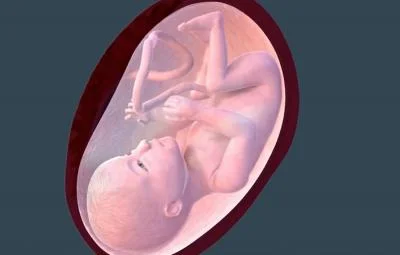Your Baby
Your baby is in the homestretch: As he gains weight and grows to approximately 20 inches, he has very little room to maneuver. He may already be in position for delivery, his head cradled in the pelvic cavity. The brain is one of the last organs to fully develop, and it’s almost there, its neurons firing away.
Your Body
Right now, hovering near the top of your list of worries may be what labor’s really like. Here’s what to expect: The early phase of labor can take days or even weeks, during which the cervix softens and dilates to three centimeters. The contractions are fleeting, lasting 30 to 45 seconds. When active labor kicks in, your contractions will become more powerful and more frequent and will persist for 60 seconds. Your cervix will dilate to just approximately seven centimeters, and you’ll have a harder time catching your breath between contractions. The transitional phase is next, with contractions arriving one on top of another and going for as long as 90 seconds. In a little over an hour, your cervix will dilate to ten centimeters, at which point you’ll be ready to push. Your child’s head is the biggest part of his body, so getting it out will require lots of grit and determination, not to mention some strong pushing.
Do’s and Don’ts
Your to-do list runs long, but be sure to enjoy your last few weeks of freedom. Caring for a newborn is exciting and deeply rewarding, but it doesn’t leave you much time to yourself. Make the most of your solitude now to indulge in such pleasures as reading for hours and watching first-run movies. You’ll be plenty busy once the baby’s here.
Health
To make sure your nipples protrude enough for a baby to latch on during breastfeeding, take your finger and thumb and place them above and below the areola; gently press down toward the wall of the chest. (Don’t squeeze your thumb and finger together. It may cause the nipple to invert.) The nipple should pop out. If it turns inward, ask your doctor or midwife for recommendations on how to prepare your nipples for nursing.
Mom to Mom
“Take home mementos of the hospital stay–ID bands, discharge papers, crib cards, a copy of part of the contraction-monitor tape–to keep in your baby book.”–Michelle Morrison, De Soto, IL
Shopping
Stock up on diapers, wipes, breast pads, and other essentials you’ll need immediately after you give birth. This way, you won’t have to make an emergency drugstore run for necessities during the first hectic weeks after the delivery.
Exercise
Now that you’re not working out as hard or as often, use the time to do a few relaxation exercises. Studies show that they lower your heart rate and blood pressure and put you in a great mood. Don’t know how to get started? Try this simple exercise: Lie down on your side and breathe deeply. Isolate individual muscle groups, tense them, and release as you exhale.
Relationships
Well-meaning friends and family members are probably offering their support now. Take them up on it, but be specific so you’ll get the help you need; saying “Whatever you’d like to do” could leave you with a freezer full of casseroles and no one to do the laundry. Instead, delegate tasks you know will be difficult when you have a newborn around (mowing the lawn, for example, or taking clothes to the cleaner’s.)
Siblings
Make your firstborn feel important when the baby’s here by talking about the future jobs he’ll be responsible for. Make them easy-to-manage tasks, like holding the wipes during diaper changes or turning on the mobile. You might give him a title to go with his duties, too, like “Mom’s Helper” or “Dad’s Deputy.”
Twins
When your babies arrive, divide and conquer. You’ll be able to give each child 100 percent of your attention some of the time by taking one with you to the park or on an errand, while leaving her twin with your partner. Switch off the next time around.

